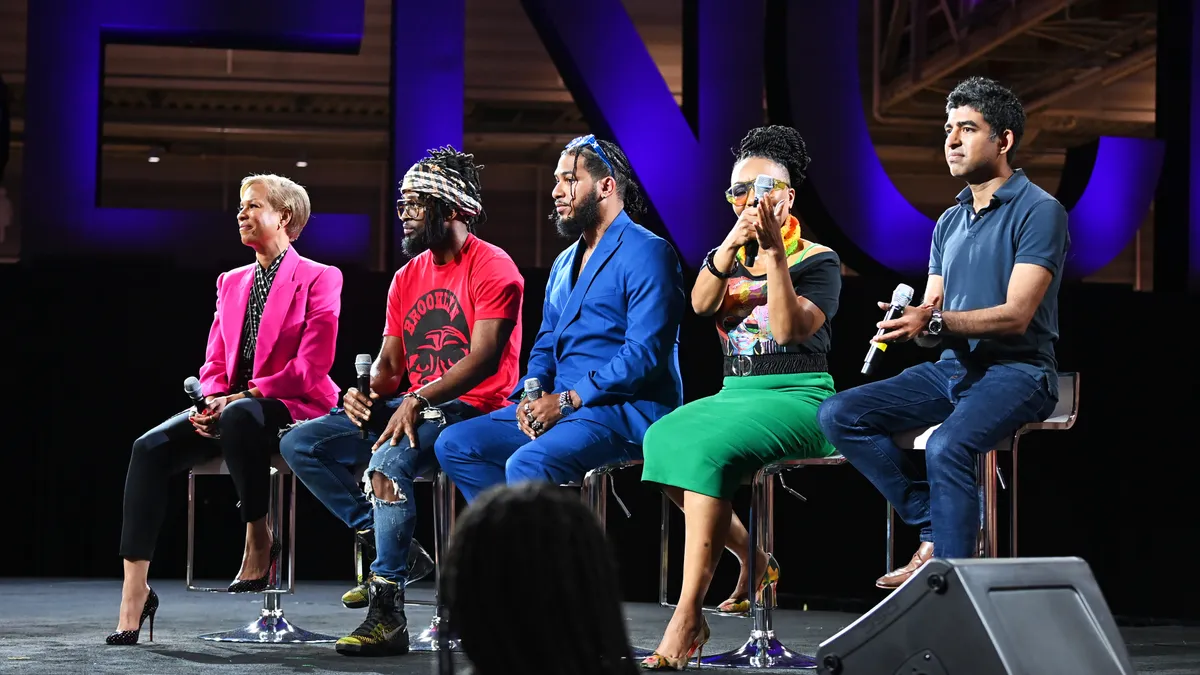In September 2017, Serena Williams became a poster child for more than just extraordinary tennis achievements or exceptional female athleticism. In giving birth to her daughter, Olympia, she became a symbol of the dangers of pregnancy and childbirth in the U.S., particularly for Black people. Williams, who experienced blood clots and needed multiple emergency surgeries in the hours after her delivery, detailed her story in Elle magazine.
The maternal mortality rate is trending in the wrong direction for all races, data from the Centers for Disease Control and Prevention shows. In 2021, the most recent year for which data is available, the rate was 32.9 in 100,000 births — nearly twice the rate of 2018, only three years earlier. For Black women, the 2021 rate was an alarming 69.9 deaths in 100,000.
In a post on her blog Parent Data, economist Emily Oster, who has carved out a niche analyzing data related to pregnancy and parenthood, stressed that the disparity cannot be chalked up to differences in average income. “Although for non-Black women the risk of negative health outcomes goes down as their income goes up, this does not happen for Black women,” Oster wrote, citing recent research. “Black women in the highest 10% in terms of income actually have serious complication rates similar to Black women in the lowest 10% in terms of income.”
Similarly, while there is a correlation between higher body mass index and negative pregnancy outcomes, and average weight differs across racial groups, this is also not a valid explanation. “Black women have more complications at all weight levels,” Oster wrote. “Notably, the serious maternal morbidity rate for underweight Black women considerably exceeds the rate for obese White women.”
Health, income and even fame were not protective factors for Serena Williams, who had to argue with hospital staff to secure a necessary CT scan. So what’s going on here?
A failure to listen
“Women are less likely to be listened to in the medical system,” Dr. Neel Shah, chief medical officer at The Maven Clinic and an assistant professor at Harvard Medical School, told HR Dive. “And women of color, and Black women in particular, are the least likely to be listened to.”
The theme of not being heard appears over and over in the stories of Black women who have given birth and either had a close call or, tragically, lost their lives.

Williams described knowing she had a history of blood clots, asking repeatedly for a blood thinner and a CT scan of her lungs. While the nurse dismissed her requests as “crazy,” Williams eventually persisted enough that her nurse finally called Williams’ OBGYN, who agreed with Williams’ assessment. The scan found a blood clot in her lungs. “Being heard and appropriately treated was the difference between life or death for me,” she wrote.
“There’s a very thin line between what’s celebrated as clinical intuition and what’s effectively racism.”

Dr. Neel Shah
Chief medical officer, The Maven Clinic
The documentary “Aftershock” follows the families of two Black women who were less fortunate. Shamony Gibson died of a pulmonary embolism just 13 days after giving birth to her son. Amber Rose Isaac was diagnosed with HELLP syndrome and died during an emergency cesarean section. In both cases, the women complained of symptoms for weeks or months — but were ultimately dismissed until it was too late.
Doctors often want to reassure patients that pregnancy can come with changes that, while they may feel strange, are normal for the condition. But sometimes normal symptoms like fatigue and shortness of breath are indicative of much more serious conditions.
Unconscious bias can play a major role in these dismissals. “There’s a very thin line between what's celebrated as clinical intuition and what’s effectively racism,” Shah said. “You walk into a patient’s room, and if they look pale, you think, ‘Well, maybe they’re anemic.’ But of course, if you’re a person of color, you’re not going to look pale the same way.”
Looking at data from the Maternal Mortality Review Committees, Oster found that pregnancy-related deaths among Black women are significantly more likely to result from heart- or blood-related issues, like embolisms, cardiomyopathy and other cardiac conditions. “This doesn’t provide answers to why, but it is important to know because many of these conditions have better outcomes when they are treated effectively,” Oster wrote.
In other words, part of the tragedy and injustice of Black maternal deaths is just how preventable they are — if somebody is willing to listen.
Changing the approach
The Midwife Center in Pittsburgh is one of more than 400 independent birth centers across the U.S. Birth centers are designed to help people be and stay low-risk through “time-intensive, client-centered care,” Christine Haas, executive director of the Midwife Center, told HR Dive. Midwives at the center also address the social determinants of health to help people achieve a healthy pregnancy.
A 2022 study found that Black people were less likely to begin prenatal care in the first trimester, an aspect that likely contributes to worse outcomes. A range of factors is responsible for the lack of access, from what Haas calls “maternity care deserts,” or areas where there aren’t providers, to difficulty finding transportation or child care.

The Midwife Center employs a full-time community engagement coordinator to make sure it has a presence in communities across the city and to dispel myths about the types of insurance it’s able to accept. It has also worked to attract a diverse range of providers. Haas pointed to research that Black patients fare better in environments where there are more Black care providers. She also noted distrust some Black individuals have in the medical system due to a long history of structural racism.
A risk-adjusted study found that Black women, along with White and Hispanic women, experienced a reduction in poor outcomes when using a birth center compared to a hospital.
Of course, complicated pregnancies are bound to arise even with excellent care; for these situations, in which more intensive care is needed, the Midwife Center works with the patient to transfer care to either a collaborating physician or a partnering midwife group that practices in a hospital setting, Haas said. Unless the client is leaving town or another issue comes up, the transfers are always to trusted medical partners with whom the center has a close relationship, Haas said.
Where employers can step in
With the evidence indicating that strong advocacy and early intervention can change the game for Black maternal care, some employers are turning to benefits to address these gaps in the healthcare system.
In 2021, Walmart introduced a doula benefit in Georgia, which it expanded a year later to Louisiana, Indiana and Illinois, and ultimately took nationwide (except for Hawaii) in 2023. The benefit allows eligible workers to receive doula care during their pregnancy and be reimbursed up to $1,000. Walmart cited the Black maternal mortality rate in its decision to expand the benefit.
Doulas, who advocate for pregnant people during pregnancy, in labor and postpartum, can help patients ensure their preferences and concerns are heard by a provider. Their involvement in the birthing process has been shown to reduce the incidence of C-sections — which are more likely to lead to blood- and heart-related complications — and can lead to other positive outcomes, including a more satisfying birth experience.
HR pros can pursue an independent doula benefit, like Walmart, or ensure that doula care is accessible for those who want it through other benefits. Most health insurance plans do not cover doula care, although some have begun to explore the option. Rhode Island, which required private insurers to cover doula care starting in 2022, is an exception.
Flexible spending accounts can be an avenue to doula care coverage, although they can require a letter of medical necessity, which may be a barrier, depending on the accessibility of the patient’s care provider and willingness to provide the needed documentation. Still, Qef Johnson, a doula based in Brooklyn, New York, and creator of The Magical Birth, told HR Dive her clients are often able to use FSAs to cover her services.
Employers can also partner with fertility and women’s health virtual providers to serve as a bridge between workers and in-office care providers. For example, The Maven Clinic, where Johnson provides doula services, allows workers to connect with doulas, mental health specialists and other providers within 30 minutes of submitting a request for support.
The platform aims to address ongoing concerns pregnant workers have and provide the more granular support they need. Shah used the example of gestational diabetes, which requires radical dietary changes and can precipitate a variety of questions about how to create a meal according to a complex set of rules and how to deal with blood sugar issues. Through the Maven Clinic and similar platforms, workers can connect not just with primary care providers but also dietitians and other specialists they might need.
Ovia Health, which provides similar support, found through a study last year that Black women rated digital maternal health tools among their top five most important benefits, while White women did not — suggesting the accessibility such benefits provide may help to fill a gap in care experienced by Black workers before, during and after pregnancy.
Beyond healthcare, Shah, Haas and Johnson all emphasized the importance of adequate parental leave in the postpartum period. In addition to making the benefit available, others have suggested that employers serious about providing support should build a culture that encourages workers to take advantage of it.
Finding the joy
While statistics surrounding Black pregnancy and delivery are sobering, HR professionals also can make room for the joy and excitement that expecting a new life can bring. Connecting pregnant workers with supporters who fiercely advocate for their health and interests may help them to focus on what matters.

The fear of not being heard can itself prevent people from having the kind of birth they might want, Johnson told HR Dive, with some pregnant people using their fear, rather than their desire, to determine they either want a very medicalized or a very unmedicalized birth. While she’ll talk about it, there’s a point after which Johnson says she doesn’t want her clients to focus on the disparity in outcomes.
The stress of racism compounds and creates more stress. “It’s kind of like a cycle,” she said. On the other hand, those confident in the support they have from a provider or advocate can go into the birthing process empowered.
“I had one client who came into pregnancy really nervous about Black maternal health,” Johnson said. “When we got to labor and delivery, she was all about what she wanted, and just had that energy to convince everybody to pay attention to her and to follow her intuition, birth the way she want[ed], and [she] ended up with a really good experience.”
“Once you feel like you have that support, then you feel you can do what you need to do,” Johnson said.
Clarification: This story has been updated to include Johnson’s role at The Maven Clinic.












